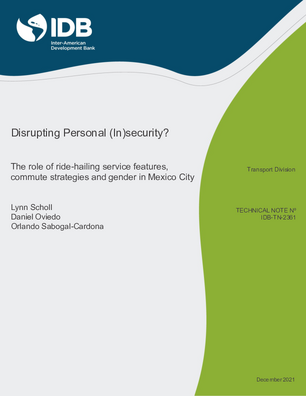Disrupting Personal (In)Security?: The Role of Ride-Hailing Service Features, Commute Strategies, and Gender in Mexico City
Date
Dec 2021
This paper sheds light on the personal security dimension of ride-hailing from a gender perspective. We explore how features of Transportation Network Companies (TNCs) services affect riders perceptions of security when commuting in ride-hailing services, and how general perceptions of fear of crime shape the way people value such features. Moreover, we analyze the strategies women and men are using to enhance their own security in ride-hailing and factors influencing these strategies. We conducted a survey of users of the TNC DiDi in Mexico City. The statistical methods used are structural equation models SEM and ordered logit models OLOGIT. Results show that women are more likely to value the information made available by ride-hailing applications (e.g., knowing your location or knowing driver information) and the presence of a panic button. The value given to information also increases if a person feels insecure in the streets, in a public transit station or in public transit. People who perceive higher insecurity in the streets have increased positive perceptions of the possibility of travelling without transfers. We also find that women are 64.4% less likely to share ride-hailing trips (pooling) and 2.14 times more likely to share details of their trips through their cellphones.




